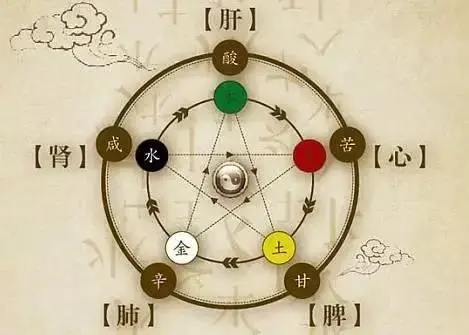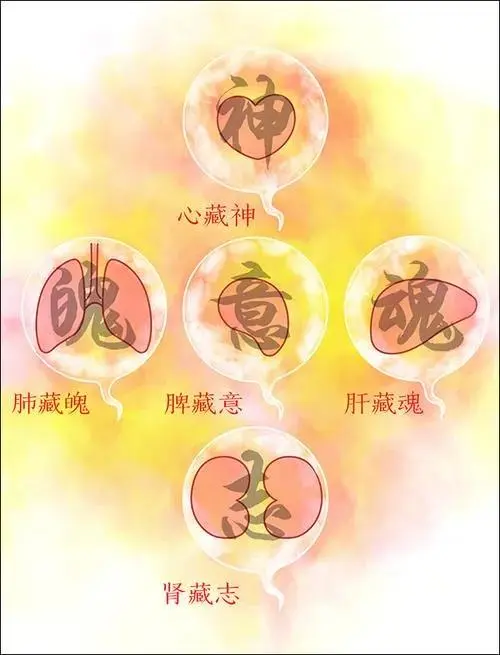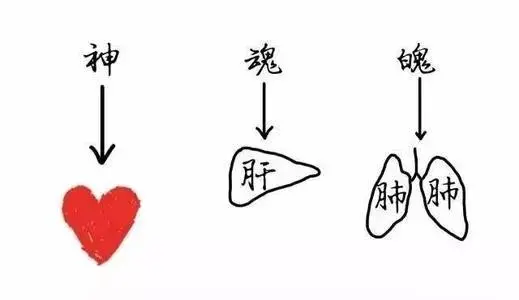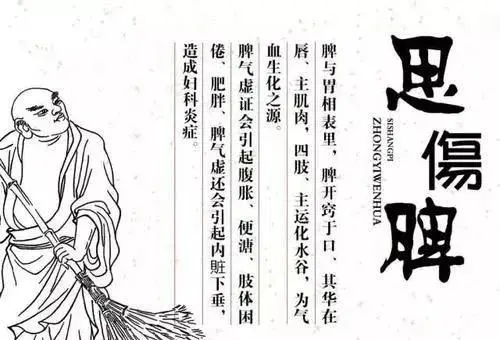Traditional Chinese Medicine (TCM) believes that the five organs house the five spirits, and eating is akin to offering sacrifices to our “five organ spirits”.
But do you know why the “five organs” are referred to as “temples”? The concept of the five organs housing spirits may sound mystical, but it is based on evidence. The “Ling Shu” states: “When the blood and qi are harmonious, the nutritive and defensive qi are connected, the five organs are complete, the spirit resides in the heart, and the soul and po are fully present, then one becomes a person.”

This means that only when both form and spirit are present can a person be considered healthy and vibrant.
Here, form refers to the five organs: heart (xin), liver (gan), lung (fei), spleen (pi), and kidney (shen); while spirit refers to the psychological aspects housed within these organs: shen (神), hun (魂), po (魄), yi (意), and zhi (志), collectively known as the “five intentions” in TCM.
The “five intentions” are not merely abstract concepts; they have a material basis, which is essence (jing), stored within the five organs.

What does the theory of “five organs housing spirits” entail?
TCM posits that “the heart is the sovereign organ, from which the spirit emerges.” The heart has the function of housing the main spirit, meaning it governs the spiritual activities of the body. Modern medicine often treats brain diseases by focusing on the heart. However, TCM also speaks of the “five spirits” and believes that spiritual activities are governed by the five organs, specifically: “the heart houses the shen, the lung houses the po, the liver houses the hun, the spleen houses the yi, and the kidney houses the zhi,” collectively referred to as “the five organs housing spirits.” What do these spirits represent, and how are they related to the five organs?
The five spirits: hun, shen, yi, po, and zhi can be simply understood as follows: shen primarily refers to the unpredictable nature of spiritual activities, hun refers to the “subconscious” of a person, po refers to sensory perceptions such as temperature and pain, yi refers to thought, intention, and inspiration, and zhi refers to memory and willpower. All these are related to brain function. The five spirits are not absolutely independent; they are closely interconnected, making it difficult to distinguish them clearly, and they collectively maintain the normal state of the human spirit.

(1) Shen and Heart:
In TCM, the term shen is very broad, encompassing all human spiritual and psychological activities. Sensations, cognitive processes, memory processes, and the generation of thoughts are attributed to the heart, referred to as “the heart houses the shen.” This is the foundation and premise for our activities of perception, thought, will, and emotion. Thus, the function of the heart permeates the other four spirits, serving as their foundation and premise. In this sense, the heart’s spirit is merely a leader and does not represent a specific entity. However, when the five spirits are considered in parallel, here, shen refers to the mysterious and unpredictable nature of human spirit and thought. When the heart’s spirit is clear, all our spiritual activities are normal and responsive. Conversely, when the heart’s spirit is unclear, as in the case of patients with mental illness or coma, spiritual activity ceases to exist, let alone change.

(2) Hun and Liver:
We often hear phrases like “the hun is not at home,” “the hun is entangled in dreams,” and “the fright has scattered the po.” Here, hun primarily refers to attention, subconscious, and judgment, and is related to sleep. TCM believes that “the liver stores blood,” and the liver can maintain our mental comfort, being regarded as “the general’s organ, from which strategies emerge.” When liver blood is deficient, the spirit is not nourished, leading to issues such as difficulty concentrating, vivid dreams, talking in one’s sleep, or even sleepwalking.

(3) Po and Lung:
Generally, the auditory perception of the ears, the visual perception of the eyes, and the sensory functions of the skin such as temperature and pain are considered to be the po. TCM holds that the lung governs qi, assists the heart in circulating blood, and governs the skin and hair. When qi and blood are sufficient and distributed throughout the body, sensory functions are normal.
(4) Yi and Spleen:
Yi refers to “thinking, contemplation, intention, and inspiration.” TCM believes that the spleen governs the emotions of “thinking.” Only through thinking can intention and inspiration arise. The spleen is the master of the digestive system and the foundation of postnatal essence, which is the basis for generating qi and blood. Only when the spleen and stomach function well can there be sufficient qi and blood to nourish the brain, allowing for clear thinking. If the spleen and stomach are deficient, leading to insufficient qi and blood production, the brain will lack nourishment, and the “yi” will not be effective.

(5) Zhi and Kidney:
Zhi refers to memory and willpower. The brain is the anatomical basis for all emotional activities. As animals evolved, with the increase in brain capacity, they became increasingly intelligent. TCM believes that the fullness of the brain marrow depends on the amount of kidney essence. The kidney governs the storage of essence, and kidney essence can transform into brain marrow. When kidney essence is abundant, the brain marrow is full; when kidney essence is deficient, the marrow sea is insufficient. As we age, with the decrease of kidney essence, the brain gradually shrinks, and memory declines significantly. Therefore, tonifying kidney essence and replenishing brain marrow is also an important method for treating brain diseases.
In summary, TCM views the five organs as a systematic whole. The spiritual activities of a person—hun, shen, yi, po, and zhi—are distributed among the five organs, but the heart is the primary organ. The function of the brain is closely related to the heart, but also connected to the five organs. For abnormal conditions of spiritual consciousness, thought, and emotional activities, one should not simply attribute them to heart and brain disorders, but should consider treatment from the perspective of the five organs.
Disclaimer: The content of this article, if it involves formulas or therapies, is for reference only and should not be used indiscriminately. The article and images are sourced from the internet; if there is any infringement, please contact for removal.
Share this with those who care.
The more people see it, the more health there will be!
Today's Recommendations

